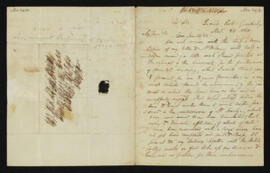With 'The order of the service in the English Church of Amsterdam' and 'Form of the public Part of Prayer in the City of Amsterdam'.
The Rectory Barley, Royston - SL would like to be a candidate for the Regius Professorship of Divinity on the imminent resignation of Dr Turton [Thomas Turton].
Trinity College - Concerning translations from some ancient casts.
The new Arabic Professor knows as many languages as HJR: 'Mr Lee [Samuel Lee] of Queen's who was originally a carpenter but took to learning languages, and was in consequence employed in translating for the Bible Society and sent to Cambridge [assisted by Isaac Milner, Master of Queen's College]'. 'There is a great spirit of reform abroad in the university at present so that though the old professors are not to be molested in their inactivity all those who are hereafter elected are to give lectures...You shall see us deviate into something good by and bye. There is something of truth and not much in what you heard about Peacock's [George Peacock] examination. He had as much analytics in his papers as ever but he took upon himself to be scandalised (not without reason) at the ignorance and superficial knowledge of applications of mathematics which he found and thereupon put a very large portion of low subjects in the viva voce, wh. made monstrous boulevarsements in the order of the tripos. As for his rude speeches I heard of none except his hoping that this examination would teach men for to speculate'. Peacock has also become engrossed in mineralogy. 'Clarke [Edward Clarke] is as edifying as ever with the addition of a fancy which he has taken of late to abuse the Quarterly Review at lectures'. WW's mechanics is at last in the press ['An Elementary Treatise on Mechanics', 1819]: 'I shall be much disappointed if you are not able to read it without any trouble, for I did not intend it for a difficult book'. WW will be interested in HJR's work on inscriptions 'for I still retain some of my zeal for philological pursuits'.
Volume of letters arranged alphabetically by correspondent, with usually no more than one letter per person, each correspondent identified at the top of the page on which the letter is mounted, in the form of an autograph book.
Carus, William (1804-1891) clergymanLetters dated 26 Jan. 1846 and 10 Nov. 1849.
